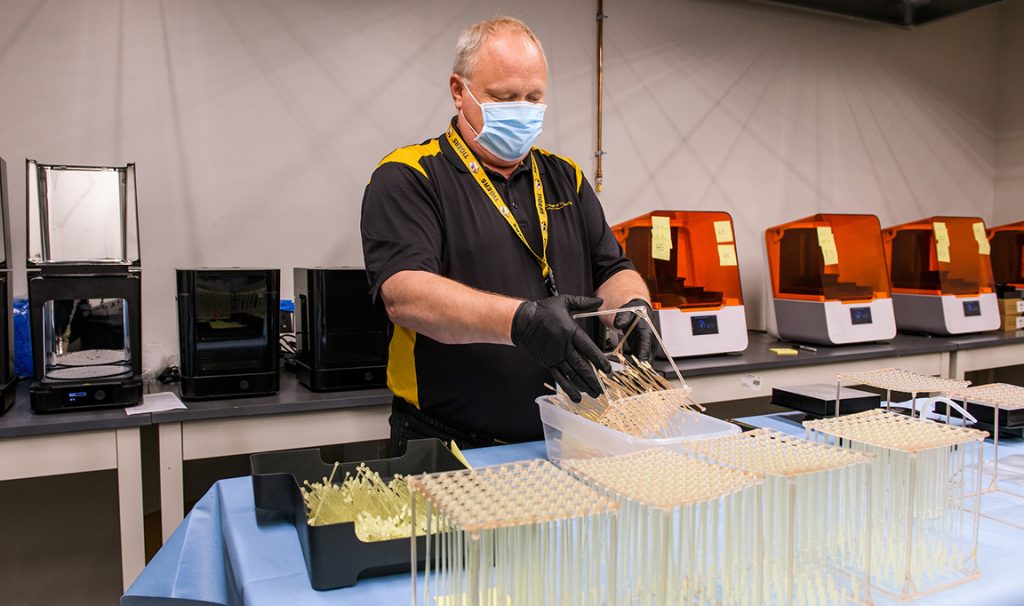June 08, 2020

Michael Absheer, the manager of the MU College of Engineering’s 3D printing lab, removes coronavirus testing swabs from a rack after they were cured in an infrared heating unit. A cross-campus team is manufacturing swabs so MU Health Care has an adequate supply to test patients for COVID-19.
The new 3D printers at the University of Missouri College of Engineering have been given colorful nicknames, ranging from the enticing PiquantPelican to the down-and-dirty FreshSlug. The nicknames are fitting, because the printers are cranking out a product that is highly coveted for an unpleasant task — coronavirus testing swabs.
Demand exceeds supply for the swabs, which are inserted deep into the nose to collect secretions from the upper throat to determine if a person is infected with COVID-19. So the Hacking COVID-19 Task Force, the cross-campus volunteer group dedicated to helping solve coronavirus problems, set out to manufacture its own.
“It’s a long plastic stick with a nylon brush on the end, but there’s a lot of things that go into that,” said Brad Myers, MU Health Care’s executive director of pharmacy and lab services, who is the team leader of the project. “They have a score mark where the swab needs to break, because it’s approximately six inches long and you can’t put the whole swab in the tube when you send it to the lab for testing. But if the swabs aren’t flexible enough, they could break while collecting the sample inside someone’s nose.”
The group’s first step was to find 3D printers that could produce swabs that meet Food and Drug Administration standards. Jaya Ghosh had experience navigating FDA regulations in her role as the program director of the MU Coulter Biomedical Accelerator, which helps the university’s scientists get their medical inventions to market. She found a Massachusetts-based company called Formlabs that could provide the 3D printers, materials and protocols needed for the project.
“For 3D printing medical devices like these swabs, there are printers that work with specialized materials,” Ghosh said. “The printers we procured are already used in dental clinics to make dental implants and guides, so the resin being used to print these swabs is cleared for clinical use.”
MU Health Care bought five printers, with the goal of printing 1,000 swabs per day and up to 15,000 in all. Michael Absheer, the manager of the College of Engineering’s 3D printing lab, set up the machines — which were assigned the funny nicknames by Formlabs — and used his expertise to troubleshoot any issues.
Formlabs provided the software that tells the printers the exact specifications for creating a swab. The printer heats up the resin and molds it into the right shape. Absheer then places the swabs in a bath of isopropyl alcohol for 20 minutes to clean them. After they dry, they are hung — 81 at a time — in a curing rack and heated to 158 degrees for a half-hour. When they emerge, they have turned from green to brown.
The final step is testing a sampling of swabs to ensure they have the correct flexibility. Ferris Pfeiffer, an assistant professor of biomedical, biological and chemical engineering, is in charge of the testing. He uses a machine that holds the swab in place and has an arm that applies force to the swab until it breaks at the score mark. The machine’s electronic sensor indicates how much force was required to break the swab.
If mechanical testing shows that these swabs break under the correct amount of pressure, they are ready to be transported to MU Health Care, where they will be further sterilized and readied for use in testing patients for COVID-19 and other respiratory infections.
“As engineers, we like to be problem-solvers,” Pfeiffer said. “This is much better than just watching and worrying about what could happen. You can use what skills you have to try to provide some solutions.”
Learn more about how you can help us contain COVID-19 at www.muhealth.org/coronavirus.